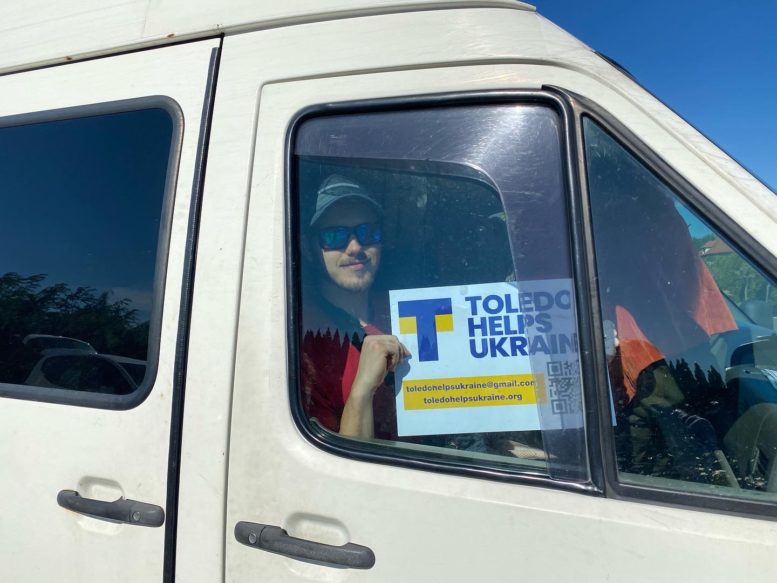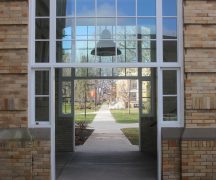By DAVID DUPONT
BG Independent News
Alona Matchenko didn’t quite make it to her hometown Kremenzhuk when she recently traveled to Ukraine. Thanks to church friends, the cooking oil, salt, flour, and other necessities she was delivering did make it to their destination without her.
In a time of war, salt or diesel, become the currency in an economy reduced to bartering. Ukraine, known as the breadbasket of Europe, is now dependent on others. The Russians, who invaded on Feb. 24, are robbing the country of its food supply.
Still for all their struggles, said Matchenko, a Perrysburg resident, the people are resilient. “You can see how united Ukrainians are. They are just unstoppable.” Their attitude is: “’I know I’m going to survive. I will get better. Our country will win.’”
Matchenko recently spent three weeks in Ukraine, Hungary and Poland. She returned on Memorial Day weekend.
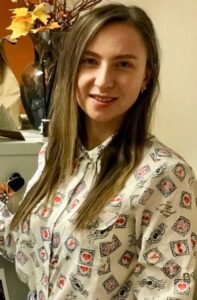
The first week was in partnership with two journalists from Block Communications, writer Jeffery Gerritt of the Pittsburgh Post-Gazette and photographer Steven Zenner of the Toledo Blade.
In exchange for serving as their translator and helping them make connections with Ukrainians in the western part of the country, the reporters helped her deliver six suitcases packed with medical supplies – tourniquets, pain killers, vitamins, bandages and lotions and personal hygiene products. Refugees had nothing in their temporary homes. She could tell how grateful they were. Some suitcases also included supplies for the military – knee pads, boots, belts t-shirts, and hats. This was carried further east toward the battlefront by others.
“All in six suitcases. They were packed,” Matchenko said. “Those two reporters were exhausted.”
Through her connections, including an aunt and cousin who are nurses, she was able to connect the journalists with surgeons who were tending the wounded in the Transcarpathian region of Ukraine.
They were treating the wounded being brought in from the East.
[Click to read Post-Dispatch story]
There were rocket strikes in nearby areas. They could see the skies light up. “People get used to sirens. They live with sirens. It’s just normal,” Matchenko said. She, however, always headed toward the basements that served as bomb shelters.
After parting ways with the journalists in Hungary, Matchenko traveled to Poland where she rendezvoused with her husband, Jesse Smith.
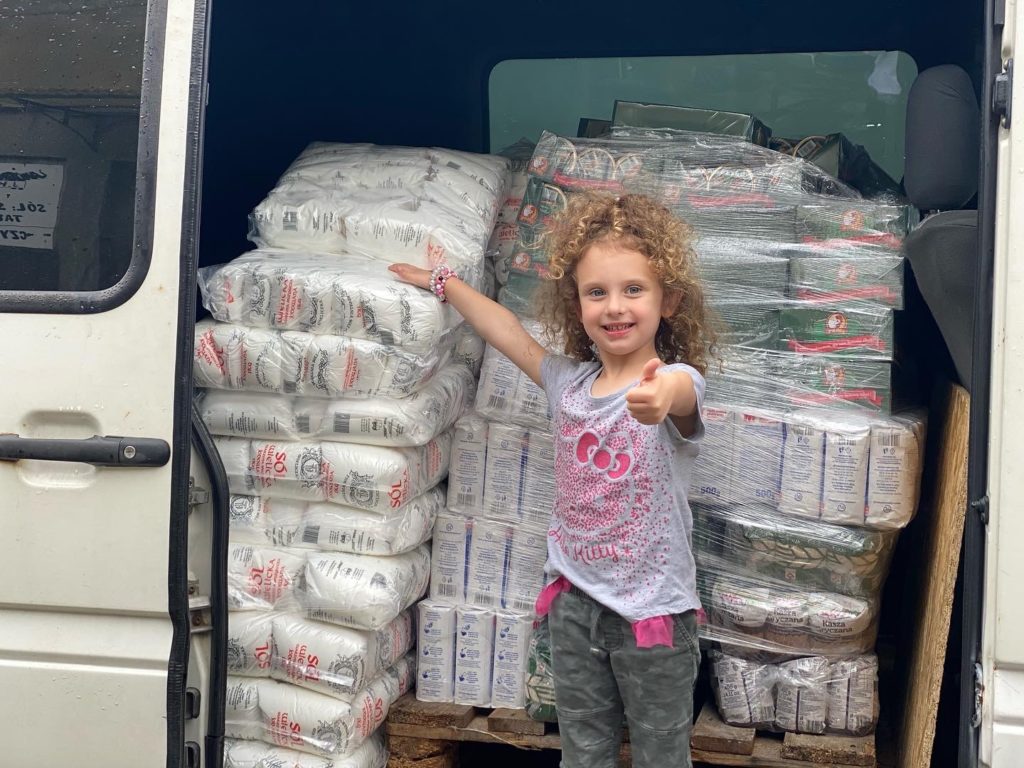
In Poland they used the more than $20,000 raised by Toledo Helps Ukraine, a non-profit Matchenko founded, to buy supplies.
The charity had already sent a shipping container of goods to Ukraine. Those were distributed through a Non-Governmental Organization. While those goods assisted Ukrainians in need, Matchenko wanted to get aid specifically to her hometown.
“That’s where I receive the most requests to me personally,” she said. “There are empty shelves – no salt, no cooking oil.”
The work would be rough. The logistics were difficult. Kremenzhuk is more than over 620 miles inside Ukraine.
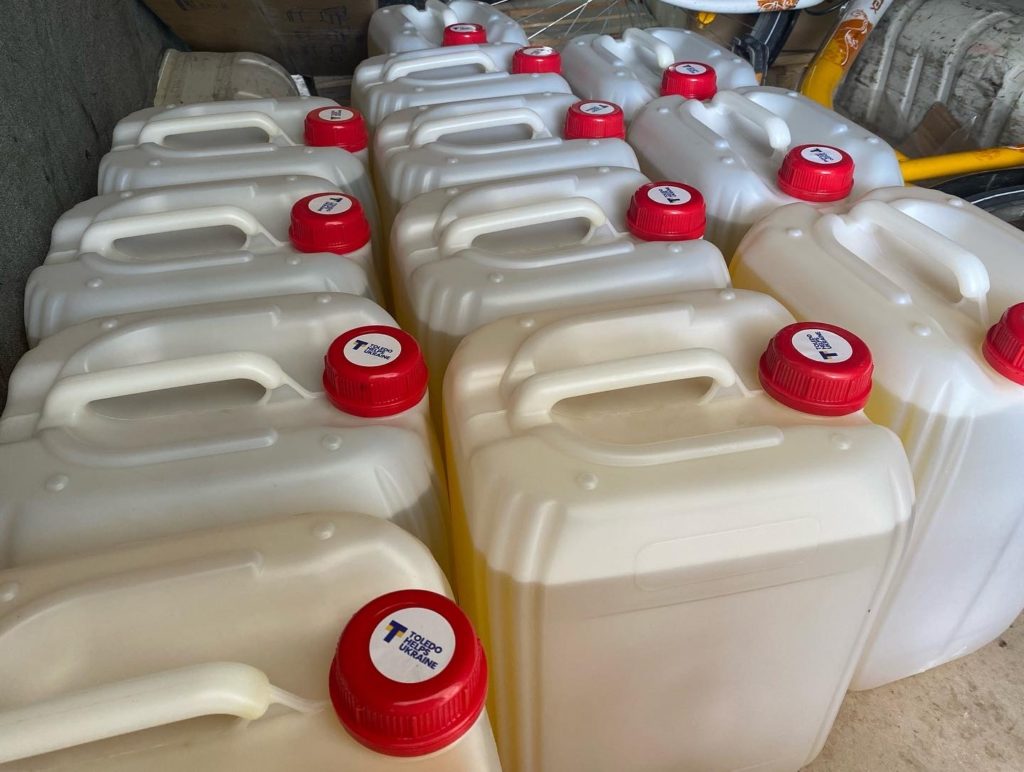
With the money raised in Toledo, Matchenko and her husband were able to secure three delivery vans that could each carry five tons of supplies.
She said they saw “God’s hand” in this. The man who helped them find the vans had been a member of the same church as Matchenko in Kremenzhuk.
Those supplies were bought in Poland, in the equivalent, she said, of Costco. “We would get pallets of canned meat, sugar, flour, salt, cooking oil, even candies. We knew kids would like candy.”
Finding help was hard. Ukrainian men in Poland could pack the vans, but they could not go back into Ukraine. Men up to the age of 65 are not allowed to leave the embattled country. Instead they would be expected to stay and fight.
Many of these men, Matchenko said, had been living in Poland for years before the invasion and returning would cost them their livelihoods and threaten the welfare of their families.
So they could help in Poland, but not continue to Ukraine.
And then there was the problem with finding fuel. In order to gas up the vans they had to wait in line all night, never sure that they would be able to buy enough fuel in the morning.
Matchenko and Smith were able to purchase 800 liters of diesel to deliver to Ukraine.
The conditions were such that once they arrived in Ukraine they could not travel all the way to Kremenzhuk. They were able to transfer the supplies to people from Matchenko’s church who took it the rest of the way.
People in Ukraine “survive as best they can,” Matchenko said.
The conditions are devastating. Buildings destroyed. All the remaining windows are taped up to prevent shards of glass from flying into the air in the case of an explosion.
“There’s a lot to rebuild – schools, houses, shops,” Matchenko said.
In Poland, they would go to the train station and find refugee families sitting on cardboard. They give them meals. In one case they were able to help a family find a home.
Still, Matchenko had a sense of satisfaction that “the simple people here in Toledo can make a difference.”
When she and her husband arrived back in Chicago, it was with a sense of relief. Gas prices may be high, but there are no long lines that wind up with a still empty tank. There is enough food. The country is not in the grips of war.
Back in Toledo there’s more work to do. Several Ukrainian families have already arrived, and Toledo Helps Ukraine will turn its attention to their needs, and the needs of others on the way.
Further down the road, she hopes Toledo can dedicate itself to rebuilding a school.
This effort shows that Toledo matters. She was interviewed by Reuters for a story on how she and other law students were addressing the Ukrainian war. She as proud that among all those from Harvard and Yale and other prestigious schools, she was representing the University of Toledo Law School.
Matchenko said she and Smith also received good news on their return. A Wood County Common Pleas Court had ruled in their favor, so their plan to open a residential home in Perrysburg for the elderly can now move forward.
Matchenko is committed to helping her mother and her family who are now refugees in Poland. This will mean her family will have to lower their own standard of living in order to continue to assist them.

